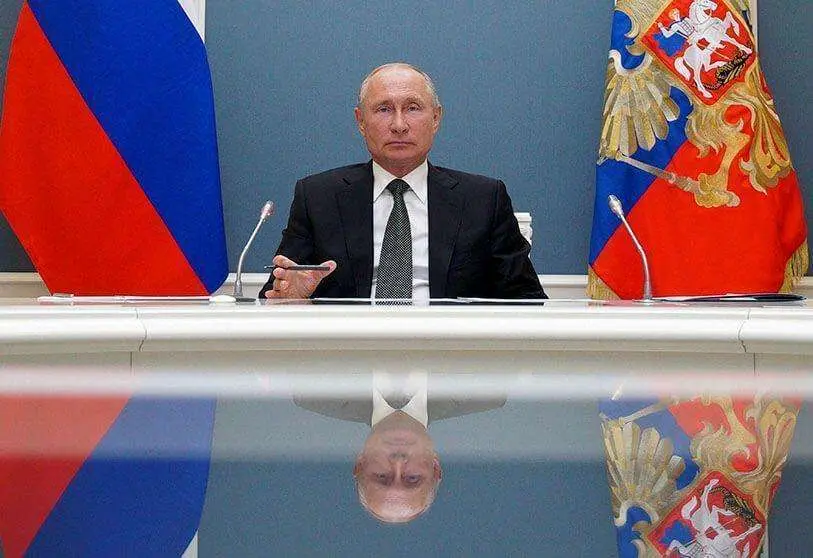Putin builds a dynamic and narrative for the war

NATO, the EU and, in short, what we still know as the West are opting for diplomacy in the face of Russia's challenge in Ukraine. They believe that this second week of January, of successive meetings, will be decisive in defusing tensions of an intensity comparable to that which was unleashed in 1962 with the installation of Soviet missiles in Cuba, which almost triggered a new world war.
Three major meetings, on which the Western allies hope Russia will finally agree to de-escalation: the face-to-face meeting on Monday and Tuesday in Geneva between the Americans and Russians, without the latter having given in to their outright refusal of the EU's presence; the meeting on Wednesday in Brussels between NATO as a whole and Russia; and finally, on Thursday in Vienna, a meeting of all the members of the Organisation for Security and Cooperation in Europe (OSCE), which will be attended by Ukraine itself, the focus and flashpoint of the current East-West conflict, as a member of the institution.
The threats from NATO and the EU at the negotiating table will have to be numerous, credible and weighty for Russian President Vladimir Putin to be convinced that it is not in his interest to plunge Europe and the rest of the world into a war of incalculable consequences, to back down and fold his sails in the escalation of words and deeds that are stark evidence of his willingness to engage in confrontation.
Recall that Putin has amassed up to 175,000 troops and a formidable combat arsenal along Ukraine's eastern border; that he has distributed 100,000 Russian passports to the population of the separatist regions of Lugansk and Donetsk; and that he and his ministers have gradually ramped up pre-war rhetoric.
Putin's lengthy pre-Christmas press conference was replete with justificatory arguments for launching an attack on Ukraine, which in subsequent days have been reinforced by several of his ministers. Thus, in addition to reiterating the "unacceptability" of Ukraine's hosting NATO offensive weapons systems, the entire argumentation hammers home the point that it is a matter of life and death for Russia to prevent Ukraine itself, Georgia and Moldova from ever joining the Atlantic Alliance.
Analyst Rebeka Koffler explains in "Military Galaxy" that it is no coincidence that Putin used the expression "We have been pinned down against the red lines" in an exclusive interview on Russian state television. That phrase," says Koffler, "invokes a legendary Russian war cry from World War II for troops to defend the homeland before a bloody battle". In case there was any doubt, he warned viewers following his remarks: "... and there is nowhere to retreat to".
Nor does Putin seem to leave much room for diplomacy when last Tuesday, just into the new year, he declared that, "even if the requirements demanded by Russia in terms of security guarantees are met, Russia cannot rely on the guarantees offered by the United States". A cold, rather icy, splash of water before sitting down at the negotiating table.
In other words, it is clear from an examination and analysis of all these facts and statements that the Russian president is building a case for attacking Ukraine whatever the US response to his demands. At his own press conference with many of the foreign correspondents present, he said that "Russia is defending itself against NATO, whose offensive strike weapons are already at our doorstep", a statement that would justify, in his view, any action he would take to counter this supposed threat.
Experts in disinformation and spreading hoaxes, the Kremlin's next echelons of power are not relentless in their efforts to reinforce Putin's narrative either. Sergey Shogu, the defence minister, last week accused the US of "preparing a provocation on Russia's borders with chemical weapons". And on Christmas Eve itself, Moscow was quick to accuse Kiev of "an act of terrorism" after an unknown person threw a Molotov cocktail at the Russian consulate in the Ukrainian city of Lviv. On Monday 3 January, its deputy minister, General Alexander Fomin, accused NATO of preparing "a large-scale, high-intensity conflict with Russia". Not to be outdone, Russia's chief diplomat, Sergey Lavrov, the same day noted his "conviction that the United States wants to provoke a small war in Ukraine in order to blame Russia".
At the same time, among Russian glossers of successive statements by Putin and his ministers, there is an abundance of references to the fact that Ukraine was never a separate country from Russia until it became one of the republics of the USSR in 1922, recalling in passing that it was the medieval Grand Prince Vladimir who in the 11th century brought Christianity to the first Slavic territory, Kievan Rus, which at that time already included the principalities of Russia and Ukraine.
Not so long has passed since Russia's invasion of Crimea in March 2014 and its subsequent annexation by force. In those days Putin's rhetoric was exactly the same as it is now: Crimea was always an inseparable part of Russia, both in people's hearts and minds. The same thing he has been repeating almost incessantly since last July: "Russians and Ukrainians are one people, a single whole".
Military analysts like Rebekah Koffler have little doubt that Putin is skilfully exploring the weaknesses of NATO and the United States (the EU is deliberately ignored), and conclude that if he sees the slightest hint that the West will crumple and not dare a head-on clash, Ukraine can prepare itself for the inevitable Russian invasion.

